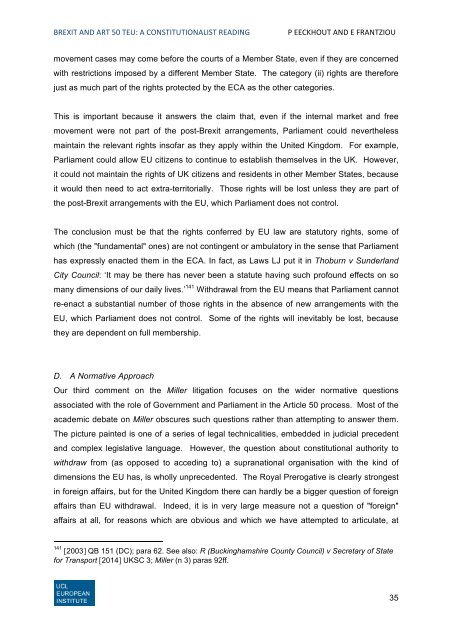brexit-article-50
brexit-article-50
brexit-article-50
Create successful ePaper yourself
Turn your PDF publications into a flip-book with our unique Google optimized e-Paper software.
BREXIT'AND'ART'<strong>50</strong>'TEU:'A'CONSTITUTIONALIST'READING''''''''''''''''''''P'EECKHOUT'AND'E'FRANTZIOU'<br />
movement cases may come before the courts of a Member State, even if they are concerned<br />
with restrictions imposed by a different Member State. The category (ii) rights are therefore<br />
just as much part of the rights protected by the ECA as the other categories.<br />
This is important because it answers the claim that, even if the internal market and free<br />
movement were not part of the post-Brexit arrangements, Parliament could nevertheless<br />
maintain the relevant rights insofar as they apply within the United Kingdom. For example,<br />
Parliament could allow EU citizens to continue to establish themselves in the UK. However,<br />
it could not maintain the rights of UK citizens and residents in other Member States, because<br />
it would then need to act extra-territorially. Those rights will be lost unless they are part of<br />
the post-Brexit arrangements with the EU, which Parliament does not control.<br />
The conclusion must be that the rights conferred by EU law are statutory rights, some of<br />
which (the "fundamental" ones) are not contingent or ambulatory in the sense that Parliament<br />
has expressly enacted them in the ECA. In fact, as Laws LJ put it in Thoburn v Sunderland<br />
City Council: ‘It may be there has never been a statute having such profound effects on so<br />
many dimensions of our daily lives.’ 141 Withdrawal from the EU means that Parliament cannot<br />
re-enact a substantial number of those rights in the absence of new arrangements with the<br />
EU, which Parliament does not control. Some of the rights will inevitably be lost, because<br />
they are dependent on full membership.<br />
D. A Normative Approach<br />
Our third comment on the Miller litigation focuses on the wider normative questions<br />
associated with the role of Government and Parliament in the Article <strong>50</strong> process. Most of the<br />
academic debate on Miller obscures such questions rather than attempting to answer them.<br />
The picture painted is one of a series of legal technicalities, embedded in judicial precedent<br />
and complex legislative language. However, the question about constitutional authority to<br />
withdraw from (as opposed to acceding to) a supranational organisation with the kind of<br />
dimensions the EU has, is wholly unprecedented. The Royal Prerogative is clearly strongest<br />
in foreign affairs, but for the United Kingdom there can hardly be a bigger question of foreign<br />
affairs than EU withdrawal. Indeed, it is in very large measure not a question of "foreign"<br />
affairs at all, for reasons which are obvious and which we have attempted to articulate, at<br />
141 [2003] QB 151 (DC); para 62. See also: R (Buckinghamshire County Council) v Secretary of State<br />
for Transport [2014] UKSC 3; Miller (n 3) paras 92ff.<br />
35


